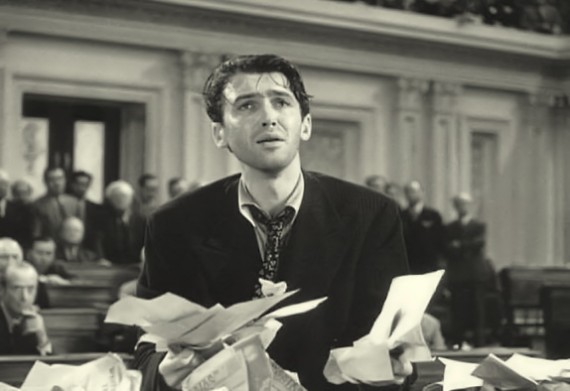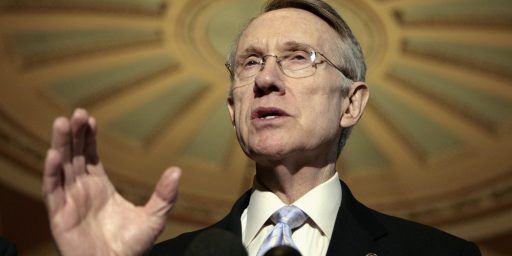Republican Senators Split On Whether To Reinstate Old Filibuster Rules
The GOP Senate Caucus seems to be split on whether or not to reinstate the filibuster for Presidential and Judicial appointments.
With just weeks to go before they take back the Senate, Republicans are debating whether to reverse some or all of the changes that Democrats made to the filibuster last year, even though making changes while President Obama is in office won’t have any real impact on the operation of the Senate:
Republicans are split over whether to change the Senate’s rules to allow filibusters on executive and judicial nominations.
As they head into a conference meeting on Tuesday, some Republicans say it’s time to undo a wrong committed by Democratic Leader Harry Reid (Nev.) and go back to rules that require 60 votes to clear most nominees.
The GOP was outraged last year after Reid and Democrats used a procedural move known as the “nuclear option” to unilaterally change the Senate’s rules to deprive the minority from being able to block most of President Obama’s nominations.
“I think it’s rank hypocrisy if we don’t,” Sen. John McCain (R-Ariz.) said when asked about reversing the rule change.
“If we don’t, then disregard every bit of complaint that we made, not only after they did it but also during the campaign,” he added. “I’m stunned that some people want to keep it.”
But other Republicans say now that Democrats have changed the rules to allow nominations aside from those to the Supreme Court to clear by majority vote, the GOP should go with the flow.
“I’m leaning toward leaving it alone,” said Sen. Chuck Grassley (R-Iowa), the incoming chairman of the Senate Judiciary Committee.
Senior Republican members of the Senate Judiciary Committee see little tactical advantage in restoring the 60-vote threshold for nominees when they control the agenda next year.
They argue that if Obama nominates officials and judges who are too extreme, the Senate Judiciary could simply not report them to the floor, or incoming Senate Majority Leader Mitch McConnell (R-Ky.) could decide not to schedule them for votes.
They assert that reversing the nuclear option would not benefit them in the long term because Democrats would likely trigger it once again if they reclaimed the majority while their party controlled the White House.
And if a Republican wins the presidency in 2016, they want that officeholder to be able to shape his or her administration and the judicial branch with as free a hand as Obama has enjoyed during the final three years of his term.
“An immediate return to the prior nominations standard under Republican control would only reward Democrats for their misdeed and — since they have reaped the benefits but borne none of the costs — Democrats would have further incentive to engage in procedural abuses,” Sen. Orrin Hatch (R-Utah), a former Judiciary Committee chairman, wrote in a Monday op-ed for Politico.
It’s unclear which position will prevail when GOP senators meet Tuesday afternoon to discuss the issue. All of the GOP senators, including the 12 newly elected freshmen from 2014, will take part in the debate.
McConnell hasn’t weighed in one way or another and will let his colleagues hash out their differences at the special caucus meeting, according to a senior GOP aide.
Grassley said that paving a smoother road for executive and judicial nominees would restore the Senate to how it was 15 years ago, before both parties began to use filibusters routinely to throw up roadblocks.
“I served 34 years in the Senate, 20 was under pretty much an environment where filibusters weren’t used against judges,” he said. “That changed in 2002, I guess. I don’t think it’s been good for the process.”
But other senior Republicans are incredulous that their colleagues would embrace Reid’s overhaul of Senate precedent, given the possibility they could again end up in the minority.
“Do we believe that Republicans will hold the majority in Congress forever? If it poisoned the well as much as it did, how could we possibly be in favor of sustaining it?” McCain said.
McCain’s ally, Sen. Lindsey Graham (R-S.C.), argues that restoring the 60-vote hurdle will make it tougher for Obama to stock the courts in the next two years.
“I think it would be smart for us to go back to the way it used to be, getting the Senate back to the way it’s always been and making it harder to get people into the court and into the executive branch, not easier,” he told conservative radio host Hugh Hewitt.
Sens. Mike Crapo (R-Idaho) and Jim Risch (R-Idaho) said Monday evening they were inclined to restore the 60-vote threshold.
Grassley, who will make a presentation at the Tuesday meeting, acknowledged he doesn’t know how it will turn out and admitted he’s open to persuasion.
At the present moment, it’s hard to see why Republicans are even bothering to debate the issue of restoring the filibuster for Judicial and Executive Branch nominees. With President Obama in the White House and the GOP under control of the Senate, Republicans will have an effective veto over these nominations over the next two years as long as the party caucus remains sufficiently united to come up with 51 votes against the nomination, which seems like a certainty in virtually all cases. Returning the rules to a situation where 60 votes would be required seems as if it would be entirely unnecessary under those circumstances. If the GOP holds on to the Senate and the GOP wins the White House, then Republicans are obviously not going to want to hand the Democratic minority the power to block Republican nominees by seeking to stop the invocation of cloture for the new President’s nominees. About the only scenario where it would be to the advantage of the GOP to see the old filibuster rules reimposed would be if it ends up back in the minority in the Senate and there is a Democratic President. However, if and when that happens again Democrats could get around GOP efforts to block nominees by repeating the action that Reid took last year. After all, by changing the rules using a simple majority Reid has established a new Senate precedent, and the GOP would arguably be following that precedent itself by changing the rules back to the old way of doing things. Changing the rules yet again, whether its in 2017, 2019, or later, wouldn’t really be that big a deal under the circumstances.
As things stand, there really isn’t any good reason for Republicans to reverse Reid’s rules changes regarding nominations. Changing the rules while Obama is President accomplishes nothing since the GOP will have the majority in the Senate. Changing them if and when a Republican takes control of the White House would make it harder for a Republican President to get their nominees through the Senate. Moreover, it’s worth noting that the “nuclear option” that Reid resorted to is something that Republicans initially threatened to do during the closing years of the Bush Administration when it was Democrats who were blocking Republican nominations. At the time, many Republican Senators made the point that a President who makes appointments to Cabinet and sub-Cabinet positions, as well as the lower Federal Courts below the Supreme Court level, deserves to have those nominations considered by an up-or-down vote in the Senate rather than blocked by Parliamentary maneuvering. At the time, I thought there was a lot of merit in that argument, and indeed perhaps an argument that this is exactly what the Constitution required. Even leaving the Constitutional argument aside, though, there has never seemed to me to be a good reason to block the President’s nominees via filibuster when its obvious that they would be confirmed if allowed to go to a final vote. One can, perhaps, complain about the manner in which Harry Reid rammed the rules change through the Senate last November, but now that it has been made it strikes me as one worth keeping. Let the nominees get their up-or-down vote. If they succeed, they succeed, and if they fail, they fail.





![Could Today Be The Day Harry Reid Goes Nuclear? [Update: Tentative Deal Reached]](https://otb.cachefly.net/wp-content/uploads/2013/07/Harry-Reid-Senate-Floor-512x256.jpg)
This blogpost will probably start yet another vitriolic thread of point, counterpoint. However, I thought I’d show you what REAL fight’n words are:
http://1.bp.blogspot.com/-muliLMY29MY/VHHQOZYI9TI/AAAAAAAAB7o/teE4BWmyi6A/s1600/Trash%2Btalking%2Bat%2Bthe%2BHarvard%2BYale%2BGame.jpg
@Guarneri:
Vitriol? I wonder if Harvard or Yale supported the Republican plan to leverage the threat of a possible federal default to achieve their political objective? Probably not, right?
@al-Ameda:
Get a life.
@Guarneri:
Such vitriol. By the way, did you support leveraging the threat of a federal default?
We’re entering our seventh year of this split. It should lead a reasonable conservative/rightish person to question the utility of Republican majorities.
Too extreme = a Democrat.
Someone’s fee-fee’s are hurt very easily.
Can’t handle fightin’ words?
Yeah this will actually be kind of telling, if they go back to the old rules it means they don’t think they are going to win the White House.
You reestablish the filibuster on Day One because it’s the right thing to do. If you need a political reason, then it can be to prove that you’re the good guys. But you shouldn’t need a political reason to be the good guys.
@Pinky:
Yes, unnecessary gridlock is what the people want. The people also do not want votes for routine presidential non-judicial appointments to ever reach the floor for an actual vote, they want those proposed appointments to be locked up in committees. And, the people always want congress to do what’s right.